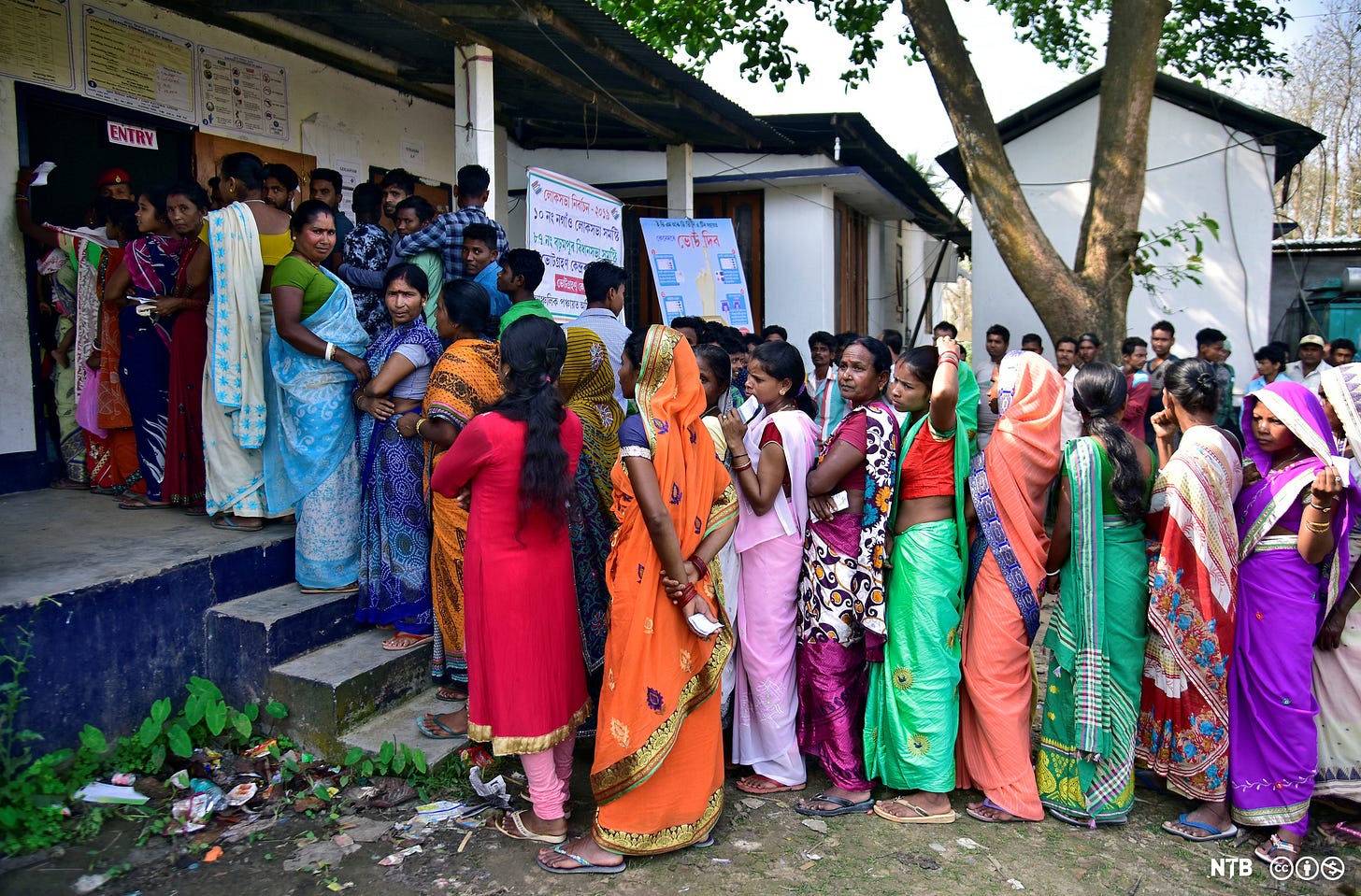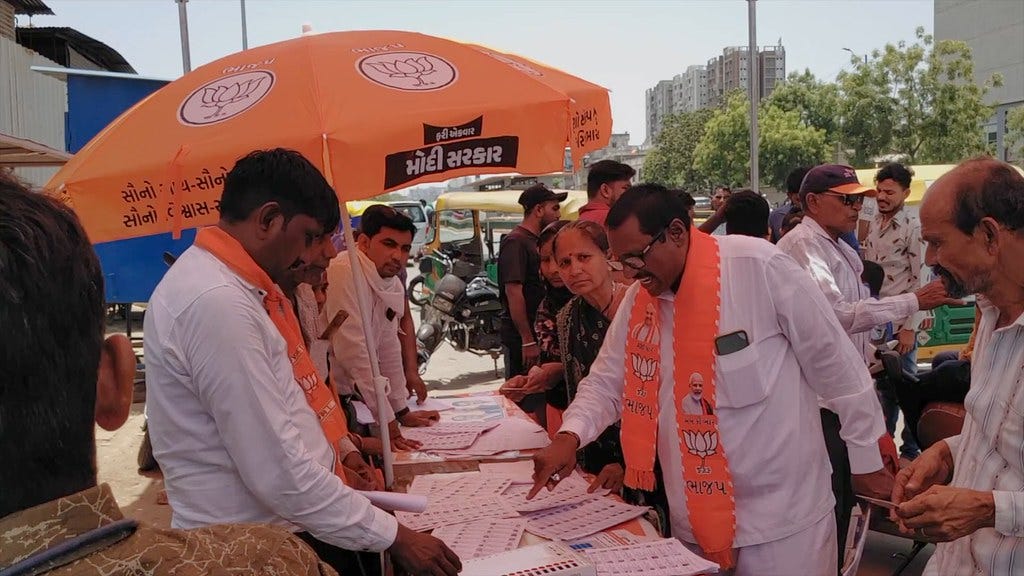Technology and Election Integrity in India
When should you introduce technology into democratic processes? How much of efficiency are you willing to tolerate at the cost of transparency?
Emerging Technologies and Election Integrity in India
968.8 million[1] citizens were eligible to vote in the 2024 general elections in India, making it the largest in the history of any democracy in the world. Managing this large electorate is not an easy task. Since the first general elections were held in 1951-52, ballot papers contained the names of candidates, the parties they represent and electoral symbols. On completion of voting, booth workers assigned by the Election Commission of India (ECI) will count the votes by hand. One of the concerns which emerged in this era was “booth capture” wherein party-workers could engage in voter suppression or stuffing ballot boxes with fake votes by intimidating booth-level officials.
Photo credit: Anuwar Hazarika, Reuters
The ECI and Technology
To address this malpractice, the ECI introduced Electronic Voting Machines (EVMs), a battery-operated device that can record voter preferences through the press of a button and tally it to give the final vote count for each candidate or party. This technological innovation introduced on a pilot basis in 1989 later became the default medium of voting since the 2014 general elections in all polling booths across the country. The usage of EVMs is not without controversy. In fact, leading up to the 2024 general elections, several cases have been filed questioning the integrity of these machines related to violation the secrecy of the ballot[2], lack of transparency in the source code of software used in the machine[3], disclosure of serial numbers and manufacturers[4], and the need to tally the votes with voter verified paper trails (VVPATs)[5]. While some of these questions require a thorough technological audit, it is beyond the purview of this post. The focus here is instead on the growing use of technology in various aspects of elections leading to a potential decrease in trust in electoral integrity and democracy.
In an open letter[6] to the Election Commission of India, as many as 11 civil society organisations expressed concerns regarding technology potentially affecting electoral outcomes. Their concerns included political advertisements in social media, deficiencies in the voluntary code of ethics which govern the 48 hours prior to voting, and the use of artificial intelligence generated visuals to manipulate voters.
Despite the serious allegations against EVMs, its introduction along with VVPATs can certainly be justified as necessary for election integrity and efficiency. However, some of the other technological choices are more dubious. For instance, the ECI has to ensure the accuracy of the voter database through house-to-house verifications, deleting the names of those deceased, permanently shifted and removing duplication errors. To manage this massive responsibility, ECI sought to link India’s biometric identification platform to the voter rolls thereby making it possible to delete and add new names more efficiently. However, in the lead up to the 2018 Telangana state elections, this seeding process deleted the names of thousands of legitimate voters from the electoral roll[7].
These were not the only instances of attempts to introduce emerging technologies into the electoral process. In 2022, the ECI expressed their desire to commission an analytics system that would allow them to monitor voter behaviour such as “conduct” and “time of stay” at polling booths which has since been abandoned[8]. In 2020, the Telangana State Election Commission considered the use of blockchain-based remote voting in the Hyderabad municipal elections[9]. While India has not faced a security threat in the same vein as the Cambridge Analytica scandal in the USA and UK[10], the introduction of emerging technologies in the electoral process without adequate discussion in the public domain can potentially lead to dangerous forms of voter profiling.
Political Parties and Technology
Political parties in India have various degrees of competence in the use of technology in campaigning. It would not be an exaggeration to claim that India’s incumbent Bharatiya Janata Party (BJP) possesses a competitive edge in terms of their digital infrastructure. Amit Malaviya, the national head of BJP’s Information Technology (IT) cell talked about how they leverage the use of AI and chatbots to coordinate 6 million booth-level party workers[11]. An investigative report by the Pulitzer Centre’s AI Accountability Network and Princeton University’s Digital Witness Lab showed that BJP party workers set up registration camps for their mobile application, SARAL alongside voter registration and welfare schemes thereby enabling them to potentially use the data for micro-targeting voters[12].
Credit: InOldNews | Lakshmi Patel
This was not the first instance of a political party obtaining voter data either. In 2019, an IT firm obtained access to the data of voters in the state of Andhra Pradesh when the data collected through ‘Seva Mitra’, a mobile application used by the Telugu Desam Party was passed on to the company for “curation” according to the state IT minister[13], again, making it possible to profile voters. This is eerily reminiscent of the Cambridge Analytica scandal. However, these issues still only figure in the periphery of electoral integrity in India.
Social Media Campaigns and Model Code of Conduct
One of the biggest concerns for the ECI in recent years has been the explosion of misinformation in social media. In the past decade, there has been a growing proportion of mobile-first users in India using platforms like Facebook and WhatsApp[14]. 2019 general elections was the first social media election in India in the sense that the Internet and Mobile Association of India (IAMAI) agreed to a voluntary code of ethics to be used for intermediaries and technology companies like Facebook, WhatsApp, YouTube, Twitter and Google[15]. This code was the same kind that has been in application on television and print media for decades to prevent political advertisement on the eve of voting and disclose the finances by political parties for advertisements. However, the newer definitions have been criticised for being insufficient for dealing with social media.
The scope of misinformation spreading is much more on social media. In an information environment where people rely on WhatsApp for news, the virality is harder to monitor[16]. More worryingly recent reports show an entire fringe industry of “deepfakes” using artificial intelligence that has emerged exclusively looking to partner with political parties[17].
Conclusion
What is clear from the emerging uses of technologies in electoral processes like campaigning, voter analytics, cleaning electoral rolls and voter micro-targeting is that regulations are struggling to catch up with technology. In the case of an election management agency like the ECI, there ought to be better processes in place to understand adoption of technologies that can improve efficiencies without compromising trust or integrity of electoral processes, better regulations must be in place for privacy and data protection of voter information, and regulators and election management agencies need to work with digital intermediaries to improve the credibility of information flowing through their media.
[1] Press Information Bureau, February 9, 2024 https://pib.gov.in/PressReleasePage.aspx?PRID=2005189
[2] PTI, May 17, 2024. SC Dismisses PIL Alleging Violation of Voter Secrecy https://timesofindia.indiatimes.com/india/sc-dismisses-pil-alleging-violation-of-voter-secrecy/articleshow/110203873.cms
[3] Meetu Jain, The Wire, September 22, 2023. SC Refuses to Hear Plea Seeking Audit into Source Code of Software Used in EVMs https://thewire.in/law/sc-refuses-to-hear-plea-seeking-audit-into-source-code-of-software-used-in-evms
[4] Meetu Jain, The Wire, August 29, 2023. Delhi HC Dismisses PIL Seeking Disclosure of EVM Serial Numbers and Manufacturers. https://thewire.in/law/delhi-hc-dismisses-pil-seeking-disclosure-of-evm-serial-numbers-and-manufacturers
[5] TNN, April 2, 2024. SC notice to EC on plea to tally votes with VVPATs https://timesofindia.indiatimes.com/india/sc-notice-to-ec-on-plea-to-tally-votes-with-vvpats/articleshow/108957805.cms
[6] The Wire, April 10, 2024. Concerned Over Technology Affecting Electoral Outcomes: Civil Society Outfits to ECI https://thewire.in/rights/concerned-over-technology-affecting-electoral-outcomes-civil-society-outfits-to-eci
[7] U. Sudhakar Reddy, TNN, December 9, 2018. Telangana Assembly Elections: Did Aadhaar-EPIC seeding trigger deletion of voters https://timesofindia.indiatimes.com/city/hyderabad/telangana-assembly-elections-did-aadhar-epic-seeding-trigger-deletion-of-voters/articleshow/67008173.cms
[8] Anushka Jain, Medianama, February 17, 2022. https://www.medianama.com/2022/02/223-eci-system-analyse-voter-behaviour-report/
[9] Sooumyarendra Barik, Medianama, August 11, 2020. https://www.medianama.com/2020/08/223-blockchain-remote-voting-india/
[10] Rohith Jyothish, Global Voices, April 6, 2018. India’s Data Security Dilemma Continues with Cambridge Analytica https://globalvoices.org/2018/04/06/indias-data-security-dilemma-continues-with-cambridge-analytica/
[11] Payal Ganguly, YourStory, December 1, 2023. BJP’s SARAL app to target 60+ lakh party workers daily ahead of 2024 elections https://yourstory.com/2023/11/saral-app-target-bjp-party-worker-amit-malviya-2024-elections-tech
[12] Srishti Jaiswal, Rest of World, January 20, 2024. The data collection app at the heart of the BJP’s Indian election campaign https://restofworld.org/2024/bjp-saral-app-data-gathering/
[13] PTI, March 4, 2019. IT firm got illegal access to data of Andhra Pradesh voters: Telangana Police https://timesofindia.indiatimes.com/city/hyderabad/it-firm-got-illegal-access-to-data-of-andhra-pradesh-voters-telangana-police/articleshow/68260221.cms
[14] Zeenab Aneez, Taberez Ahmed Neyazi, Antonis Kalogeropoulos, Rasmus Kleis Nielsen (2019). Reuters India Digital News Report https://reutersinstitute.politics.ox.ac.uk/sites/default/files/2019-03/India_DNR_FINAL.pdf
[15] PTI, September 26, 2019. “Voluntary Code of Ethics” by Social Media Platforms to be observed in the General Election to the Haryana & Maharashtra Legislative Assemblies and all future elections https://pib.gov.in/PressReleaseIframePage.aspx?PRID=1586297
[16] Amber Sinha, Tech Policy Press, May 24, 2024 https://www.techpolicy.press/dispatches-on-tech-and-democracy-indias-2024-elections-6/
[17] Fahad Shah, Rest of World, April 30, 2024. AI companies are making millions producing election content in India https://restofworld.org/2024/india-elections-ai-content/





